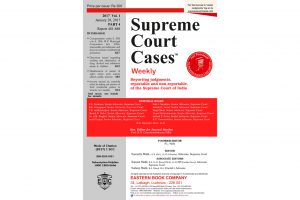Central Excise Act, 1944 — Ss. 3 and 4 (as substituted with effect from 1-7-2000) — Operation, scope and ambit of — Value of exigible goods — Determination of: Impost is on manufacture but it is the value up to the stage of the first sale that is taken as the measure and doing so does not introduce any inconsistency between the nature and character of the levy and the measure adopted. [CCE v. Grasim Industries Ltd., (2018) 7 SCC 233]
Constitution of India — Arts. 21 and 19(1)(a) and 14 — Right to marry person of one’s choice — Honour killing and other forms of honour crimes inflicted on young couples/families by Khap Panchayat: Consent of family or community or clan, not necessary when two adults agree to enter into a wedlock. Rule of Law that only formal institutions under law deal with such situations. Khap panchayat or any panchayat of any nomenclature cannot create a dent in exercise of human right, protected by rule of law. Rule of law as a concept is meant to have order in a society. Elders of family or clan can never be allowed to proclaim a verdict guided by some notion of passion and eliminate life of young who have exercised their choice to get married against wishes of their elders or contrary to customary practice of clan. Honour killing guillotines individual liberty, freedom of choice and one’s own perception of choice. When two adults consensually choose each other as life partners, it is a manifestation of their choice which is recognized under Arts. 19 and 21 of the Constitution. Such a right has constitutional sanction and thus needs protection and cannot succumb to class honour or group thinking which has no legitimacy. Constitution and the laws of country do not countenance such an act and, in fact, whole activity is illegal and punishable as offence under the criminal law. [Shakti Vahini v. Union of India, (2018) 7 SCC 192]
Education Law — Medical and Dental Colleges — Affiliation/Recognition — Renewal of — Applicability of Regn. 8(3)(1)(a) of 1999 MCI Regulations at first renewal stage: The Supreme Court held that High Court erred in holding that Regn. 8(3)(1)(a) would be applicable only to colleges seeking second renewal i.e. admissions of the third batch — First renewal is covered by proviso (a) to Regn. 8(3)(1) as language used is “up to second renewal”. If minimum requirements under Regn. 8(3) (1) not met, letter of permission cannot be granted and further compliance reinspection not permissible. Respondent colleges, thus not entitled to reinspection. [MCI v. Vedantaa Institute of Academic Excellence (P) Ltd., (2018) 7 SCC 225]
Parliament and State Legislatures — Facts and Observations contained in published Parliamentary Committee Reports — Extent to which may be relied on, in court and probative value: Said reports, held, per curiam, admissible in evidence under S. 74, Evidence Act of which judicial notice shall be taken under S. 57(4), Evidence Act. Moreover, for their production in court, permission of Speaker is also not necessary as they are already in public domain. It is court and not Parliament which has to adjudicate all factual and legal issues. People also have a right to know. No exception can be taken to the petitioners obtaining 72nd and 81st Reports of Parliamentary Standing Committee, for using it as evidence in court but Parliamentary Committee Report is not substantive evidence in case of findings of misdemeanour implicating a breach of duty by public officials or private individuals or an evasion of law or any other lis or dispute. Court has to consider other evidence and adudicate independently upon any lis/dispute(s) arising, in accordance with law. Court proceedings are independent of Parliament and based on multiple inputs and evidence. It is certainly possible for court to determine facts and form an opinion in law at variance with Parliamentary Committee report. [Kalpana Mehta v. Union of India, (2018) 7 SCC 1]
Penal Code, 1860 — S. 302 or S. 326 — Murder trial: In this case of assault by appellant-accused and 4 others (A-2 to A-5), using lethal weapons, causing death of two and grievous hurt to informant, after trespassing into informant’s house, property dispute was the cause. High Court reversed acquittal of appellant and convicted him under Ss. 302 and 326 IPC, while upholding acquittal of other 4. While determining the validity of acquittal, the Court acquitted the appellant under S. 302, but maintained the conviction under S. 326. [Jayaswamy v. State of Karnataka, (2018) 7 SCC 219]
Service Law — Recruitment Process — Examination — Scope of Judicial Review/Interference under Art. 226 of the Constitution — Interference with key answers provided by Expert Committee — Need forn judicial restraint: Constitutional courts must exercise great restraint in such matters and should be reluctant to entertain plea challenging correctness of key answers. [U.P. Public Service Commission v. Rahul Singh, (2018) 7 SCC 254]

